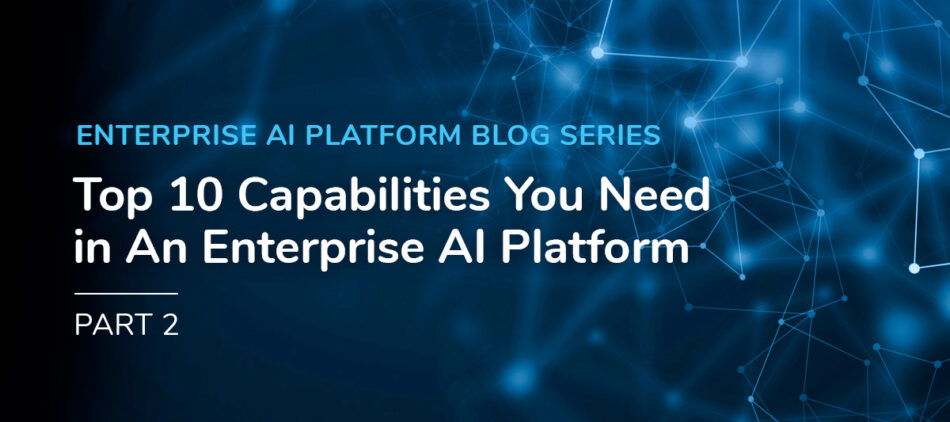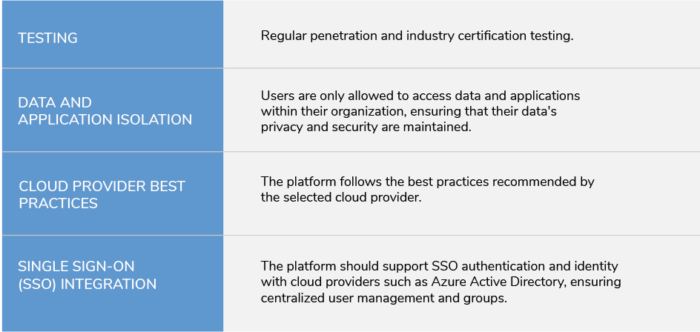
Top 10 Capabilities You Need in An Enterprise AI Platform (Part 2)
Summary:
- Any Enterprise AI platform you adopt should have secure integrations and flexible deployment to make it easy to integrate with your current technology stack
- The platform should follow security best practices, scale as needed, and have a way to monitor AI model performance
- Veritone aiWARE is a hyper-expansive Enterprise AI platform built with the flexibility to meet the needs of any AI practice or project
In the previous blog in this two-part series, we highlighted organizations’ struggles when trying to implement an AI practice. An Enterprise AI platform can solve many of these challenges. But to adopt the right platform for your needs, you must ensure it has the right capabilities. In this blog, we’ll cover the remaining five must-have capabilities of an Enterprise AI platform.
Secure Application Integrations
Most Enterprise AI platforms use several underlying technologies to guarantee that API communications are secure within your ecosystem, for example, GraphQL APIs and RESTful route-based HTTP APIs.
In addition, API styles can be mixed and matched based on the users’ needs. The best platforms also support graphical low-code/no-code workflow approaches to building ingest-process-output workflows and integrating with systems. In general, an AI platform should offer a flexible yet straightforward infusion of resulting AI model outputs into the applications and processes that need this data.
Flexible Deployment
Flexibility in how your team deploys an AI platform will contribute to how long it takes to implement. If you have to onboard AI models that don’t come with the platform out of the box, your teams should approach it using The Docker Method, which has the following benefits:
- Containerization enables model refresh, clean up, and repair without taking down the entire platform
- Docker containers provide immutable code and allow the cognitive processing layer to run any AI technology, including Nvidia, TensorFlow, PyTorch, Caffe, Keras, and others.
- Faster overall model deployment, model testing, and rollbacks, and greater flexibility in the model deployment location
In addition, the platform should have the flexibility to support either public or private cloud or on-premise deployments. For the cloud, it should support your cloud of choice, such as AWS or Azure commercial or government. But if, for some reason, you can’t deploy entirely on the cloud, the platform should have the capability to deploy with a hybrid approach. For instance, file ingestion and cognitive processing can run on-premise while outputs are sent to the cloud for integration with cloud-based systems.
Highly Scalable
The scalability of the platform you pick can make your AI project go smoothly or quickly derail your plans as system usage grows. Organizations will always have peaks and lows in what it needs at any given time from their AI platform. Therefore, the platform you select should scale horizontally across CPU, GPU, IOPs, and network with the capability to auto-create clusters at the cognitive processing level when it has reached capacity.
To confirm the platform meets your scaling needs, you should make sure it checks the boxes on the following:
- Horizontal scaling
- Scaling based on CPU or GPU utilization
- Auto-scale groups based on a cognitive category
- IO scaling through sharding
- Parallel cognitive processing
- Sequential cognitive chaining
- Heterogeneous cognitive processing
Industry-standard Security
Most platforms leverage several industry standards, but if they don’t, then that should raise a red flag. The standards it uses should include the following:

Effective Results Monitoring
It becomes highly unwieldy to manage and evaluate multiple AI models. That’s why whatever platform you adopt should provide a universal way to evaluate and monitor the performance and behavior of your AI models, even across vendors. In addition, in pre-deployment and production, model drift can cause issues later down the line and negatively affect decisions.
An Enterprise AI Platform that Meets these Needs
Veritone aiWARE, a hyper-expansive Enterprise AI platform, helps transform structured and unstructured data from audio, video, images, text, and other hard-to-reach data sources into actionable intelligence at scale. Designed for maximum flexibility, aiWARE can act as your central underlying technology to support the deployment and operationalization of your AI initiatives.
aiWARE offers best-of-breed, ready-to-deploy models in audio transcription and translation, face, voice, and object recognition, text analytics, speaker recognition, data correlation, and several other cognitive capabilities. As such, the platform removes the complexity of working across different vendors and cognitive categories.
Veritone aiWARE supports these ten must-have capabilities covered above, and is made for enterprise scale. As such, it accelerates the adoption of an AI practice across an organization. And given its flexibility, those who have already started an Enterprise AI strategy but lack key capabilities can fully use the platform to bridge their gaps today and tomorrow.